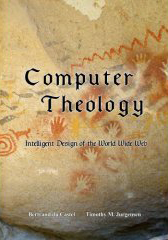PRESS
COMPUTER THEOLOGY |
||||
|
the basis for the Christian Bible New
Testament, which was actually compiled by a different set of prophets. An interesting
characteristic of religious organizations emanated from the Protestant
Reformation; secular mechanisms were instituted to deal with what we might term
the more mundane aspects of religious congregation governance. In some
instances, the entire congregation of a local church may act on certain issues
such as the selection of a new pastor for that church. For issues such as
keeping physical facilities in good repair and making sure all the bills get
paid, an elected body is often selected by the congregation. For some religious
organizations, a hierarchy of such elected bodies serves to coordinate the more
secular policy considerations for a large collection of churches. Thus, within
protestant Christianity we see the mechanism of both religious and secular
governance social systems. Solon was a
Greek philosopher, statesman and politician who lived around 600 B.C. Due to
his widespread popularity among all the social ranks of the city-state of Within a
democratic domain, the source of policy is the collective action of the solons
representing some assembly of people. A variety of mechanisms are found around
the world for elected representatives to effect policy. In the Arbiters of Interaction Rules
The governance
of consequences is central to any social ecosystem. Beyond a purely objective
identification and enforcement of consequences, a social ecosystem has at the
pinnacle of its controlling architecture an arbiter with ultimate authority for
the application of consequences. There are three distinct variants of such
arbiters found within the primary social ecosystems of the |
||||
|
||||
© Midori Press, LLC, 2008. All rights reserved for all countries. (Inquiries) The contents of ComputerTheology: Intelligent Design of the World Wide Web are presented for the sole purpose of on-line reading to allow the reader to determine whether to purchase the book. Reproduction and other derivative works are expressly forbidden without the written consent of Midori Press. Legal deposit with the US Library of Congress 1-33735636, 2007.
|
ComputerTheology Intelligent Design of the World Wide Web Bertrand du Castel and Timothy M. Jurgensen Midori Press, Austin Texas 1st Edition 2008 (468 pp) ISBN 0-9801821-1-5 |
Book available at Midori Press (regular) |
